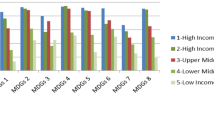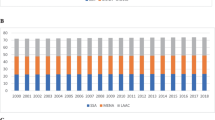Abstract
This study analyses the relationship between information and communication technology (ICT) and population health. The analysis is based on econometric model of population health in 184 countries using panel data spanning over 1990–2014. The analysis is based on fixed effects method on the basis of Hausman test. Besides, to deal with endogenous nature of ICT two stage least squares and system GMM are used in cross-sectional and panel data, respectively. Health is measured by life expectancy at birth and infant mortality rates. In this study, we measure ICT infrastructure using three proxies namely internet users, mobile cellular subscriptions, and fixed telephone subscriptions. The empirical results show a positive and significant impact of ICT on population health. This study recommends that health care programs need to focus on polices which foster digital inclusion.
Similar content being viewed by others

Notes
The statistics are calculated over the period 1960–2015.
References
Bankole, F.O., Osei-Bryson, K.M., Brown, I.: The impact of ICT investments on human development: a regression splines analysis. J. Glob. Inf. Technol. Manag. 16(2), 59–85 (2013)
Bayati, M., Akbarian, R., Kavosi, Z.: Determinants of life expectancy in Eastern Mediterranean Region: a health production function. Int. J. Health Policy Manag. 1(1), 57–61 (2013)
Bend, J.: Public Value and E-Health, Institute of Public Policy Research. London, UK. (2004). https://www.ippr.org/files/ecomm/files/public_value_ehealth.pdf
Blaya, J.A., Fraser, H.S., Holt, B.: E-health technologies show promise in developing countries. Health Aff. 29(2), 244–251 (2010)
Broom, A.: Virtually healthy: the impact of internet use on disease experience and the doctor-patient relationship. Qual. Health Res. 15(3), 325–345 (2005)
Bukachi, F., Pakenham-Walsh, N.: Information technology for health in developing countries. Chest J. 132(5), 1624–1630 (2007)
Chetley, A., Davies, J., Trude, B., McConnell, H., Ramirez, R.: Improving health connecting people: the role of ICTs in the health sector of developing countries. A framework paper. Infodev, pp. 31–65 (2006)
Cole, J., Watkins, C., Kleine, D.: Health advice from Internet discussion forums: how bad is dangerous? J. Med. Internet Res. 18(1), e4 (2016)
Cole-Lewis, H., Kershaw, T.: Text messaging as a tool for behavior change in disease prevention and management. Epidemiol. Rev. 32(1), 56–69 (2010)
Déglise, C., Suggs, L.S., Odermatt, P.: SMS for disease control in developing countries: a systematic review of mobile health applications. J. Telemed. Telecare 18(5), 273–281 (2012)
Fayissa, B., Gutema, P.: Estimating a health production function for Sub-Saharan Africa (SSA). Appl. Econ. 37(2), 155–164 (2005)
Ferguson, T.: Online patient-helpers and physicians working together: a new partnership for high quality health care. BMJ 321(7269), 1129 (2000)
Gerber, B.S., Eiser, A.R.: The patient-physician relationship in the Internet age: future prospects and the research agenda. J. Med. Internet Res. 3(2), e15 (2001)
Grossman, M.: On the concept of health capital and the demand for health. J. Political Econ. 80(2), 223–255 (1972)
Impicciatore, R., Dalla Zuanna, G.: The impact of education on fertility in Italy. Changes across cohorts and south–north differences. Qual. Quant. 51(5), 2293–2317 (2017)
Khan, R.E.A., Raza, M.A.: Child malnutrition in developing economies: a case study of Bangladesh. Qual. Quant. 48(3), 1389–1408 (2014)
Kiley, R.: Does the internet harm health? Some evidence exists that the internet does harm health. BMJ Br. Med. J. 324(7331), 238 (2002)
Kumar, R.R., Singh, M.: Role of health expenditure and ICT in a small island economy: a study of Fiji. Qual. Quant. 48(4), 2295–2311 (2014)
Laing, A., Hogg, G., Winkelman, D.: Healthcare and the information revolution: re-configuring the healthcare service encounter. Health Serv. Manag. Res. 17(3), 188–199 (2004)
Lucas, H.: Information and communications technology for future health systems in developing countries. Soc. Sci. Med. 66(10), 2122–2132 (2008)
Majeed, M.T., Gillani, S.: State capacity and health outcomes: an empirical analysis. Pak. J. Commer. Soc. Sci. 11(2), 671–697 (2017)
Mohapatra, S.: Health inequity and health outcome: a causal linkage study of low and middle income countries. Qual. Quant. 51(6), 2475–2488 (2017)
Morawczynski, O., Ngwenyama, O.: Unraveling the impact of investments in ICT, education and health on development: an analysis of archival data of five West African countries using regression splines. Electronic J. Inf. Syst. Dev. Ctries. 29, 5 (2007)
Murray, E., Lo, B., Pollack, L., Donelan, K., Catania, J., White, M., Zapert, K., Turner, R.: The impact of health information on the internet on the physician-patient relationship: patient perceptions. Arch. Intern. Med. 163(14), 1727–1734 (2003)
Ngwenyama, O., Andoh-Baidoo, F.K., Bollou, F., Morawczynski, O.: Is there a relationship between ICT, health, education and development? An empirical analysis of five West African countries from 1997–2003. Electron. J. Inf. Syst. Dev. Ctries. 23, 1–11 (2006)
Nilseng, J., Gustafsson, L.L., Nungu, A., Bastholm-Rahmner, P., Mazali, D., Pehrson, B., Eriksen, J.: A cross-sectional pilot study assessing needs and attitudes to implementation of Information and Communication Technology for rational use of medicines among healthcare staff in rural Tanzania. BMC Med. Inform. Decis. Mak. 14(1), 1 (2014)
Sharf, B.F.: Communicating breast cancer on-line: support and empowerment on the Internet. Women Health 26(1), 65–84 (1997)
Tanis, M., Hartmann, T., Te Poel, F.: Online health anxiety and consultation satisfaction: a quantitative exploratory study on their relations. Patient Educ. Couns. 99(7), 1227–1232 (2016)
Wald, H.S., Dube, C.E., Anthony, D.C.: Untangling the Web—the impact of Internet use on health care and the physician–patient relationship. Patient Educ. Couns. 68(3), 218–224 (2007)
Tsai, Y.Y., Chao, C.M., Lin, H.M., Cheng, B.W.: Nursing staff intentions to continuously use a blended e-learning system from an integrative perspective. Qual. Quant. (2017). https://doi.org/10.1007/s11135-017-0540-5
Author information
Authors and Affiliations
Corresponding author
Appendix
Appendix
See Tables 8, 9, 10, 11, 12, 13, 14.
Rights and permissions
About this article
Cite this article
Majeed, M.T., Khan, F.N. Do information and communication technologies (ICTs) contribute to health outcomes? An empirical analysis. Qual Quant 53, 183–206 (2019). https://doi.org/10.1007/s11135-018-0741-6
Published:
Issue Date:
DOI: https://doi.org/10.1007/s11135-018-0741-6



